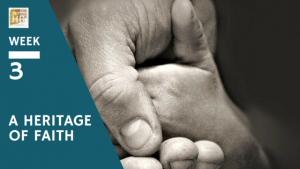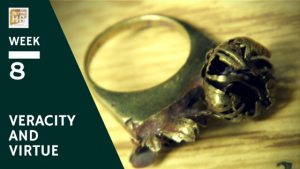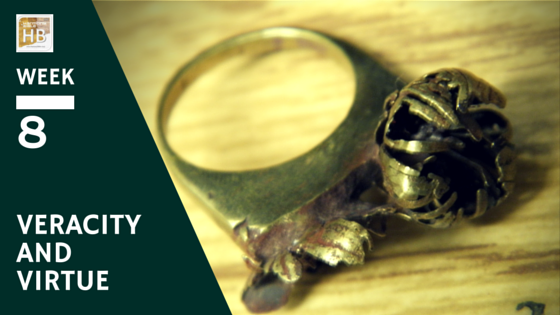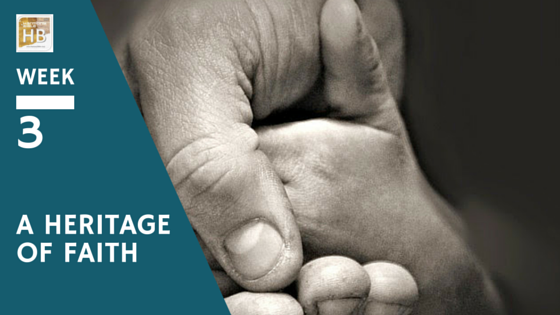Week 3 | Section 3
 It would be considered reasonable by many to skip over section three in the chronological Harmony of the Gospels as on the surface it includes only a genealogical list of names that are hard to pronounce. While both Matthew and Luke make plain his virgin birth, and therefore his deity, Luke’s genealogy emphasizes his humanity recounting the progenitors from the first Adam to Christ; while Matthew provides us the names of those who were heirs to the Davidic throne. The genealogical records of Matthew and Luke celebrates Jesus’ family roots and rights by which in human and divine courts provide unequivocal evidence that He is the Messiah – the long awaited King of kings and Redeemer of the world.¯
It would be considered reasonable by many to skip over section three in the chronological Harmony of the Gospels as on the surface it includes only a genealogical list of names that are hard to pronounce. While both Matthew and Luke make plain his virgin birth, and therefore his deity, Luke’s genealogy emphasizes his humanity recounting the progenitors from the first Adam to Christ; while Matthew provides us the names of those who were heirs to the Davidic throne. The genealogical records of Matthew and Luke celebrates Jesus’ family roots and rights by which in human and divine courts provide unequivocal evidence that He is the Messiah – the long awaited King of kings and Redeemer of the world.¯
Scripture:
[one_half last=”no”]Matthew 1:1-17
1 The book of the genealogy of Jesus Christ, the son of David, the son of Abraham. 2 Abraham became the father of Isaac. Isaac became the father of Jacob. Jacob became the father of Judah and his brothers. 3 Judah became the father of Perez and Zerah by Tamar. Perez became the father of Hezron. Hezron became the father of Ram. 4 Ram became the father of Amminadab. Amminadab became the father of Nahshon. Nahshon became the father of Salmon. 5 Salmon became the father of Boaz by Rahab. Boaz became the father of Obed by Ruth. Obed became the father of Jesse. 6 Jesse became the father of King David. David became the father of Solomon by her who had been Uriah’s wife. 7 Solomon became the father of Rehoboam. Rehoboam became the father of Abijah. Abijah became the father of Asa. 8 Asa became the father of Jehoshaphat. Jehoshaphat became the father of Joram. Joram became the father of Uzziah. 9 Uzziah became the father of Jotham. Jotham became the father of Ahaz. Ahaz became the father of Hezekiah. 10 Hezekiah became the father of Manasseh. Manasseh became the father of Amon. Amon became the father of Josiah. 11 Josiah became the father of Jechoniah and his brothers, at the time of the exile to Babylon. 12 After the exile to Babylon, Jechoniah became the father of Shealtiel. Shealtiel became the father of Zerubbabel. 13 Zerubbabel became the father of Abiud. Abiud became the father of Eliakim. Eliakim became the father of Azor. 14 Azor became the father of Zadok. Zadok became the father of Achim. Achim became the father of Eliud. 15 Eliud became the father of Eleazar. Eleazar became the father of Matthan. Matthan became the father of Jacob. 16 Jacob became the father of Joseph, the husband of Mary, from whom was born Jesus, who is called Christ. 17 So all the generations from Abraham to David are fourteen generations; from David to the exile to Babylon fourteen generations; and from the carrying away to Babylon to the Christ, fourteen generations.[/one_half]
[one_half last=”yes”]Luke 3:23-38
23 Jesus himself, when he began to teach, was about thirty years old, being the son (as was supposed) of Joseph,the son of Heli, 24 the son of Matthat, the son of Levi, the son of Melchi, the son of Jannai, the son of Joseph, 25 the son of Mattathias, the son of Amos, the son of Nahum, the son of Esli, the son of Naggai, 26 the son of Maath, the son of Mattathias, the son of Semein, the son of Joseph, the son of Judah, 27 the son of Joanan, the son of Rhesa, the son of Zerubbabel, the son of Shealtiel, the son of Neri, 28 the son of Melchi, the son of Addi, the son of Cosam, the son of Elmodam, the son of Er, 29 the son of Jose, the son of Eliezer, the son of Jorim, the son of Matthat, the son of Levi, 30 the son of Simeon, the son of Judah, the son of Joseph, the son of Jonan, the son of Eliakim, 31 the son of Melea, the son of Menan, the son of Mattatha, the son of Nathan, the son of David, 32 the son of Jesse, the son of Obed, the son of Boaz, the son of Salmon, the son of Nahshon, 33 the son of Amminadab, the son of Aram, the son of Hezron, the son of Perez, the son of Judah, 34 the son of Jacob, the son of Isaac, the son of Abraham, the son of Terah, the son of Nahor, 35 the son of Serug, the son of Reu, the son of Peleg, the son of Eber, the son of Shelah, 36 the son of Cainan, the son of Arphaxad, the son of Shem, the son of Noah, the son of Lamech, 37 the son of Methuselah, the son of Enoch, the son of Jared, the son of Mahalaleel, the son of Cainan, 38 the son of Enos, the son of Seth, the son of Adam¯, the son of God.[/one_half]
Group Dialog:
- Among those people mentioned in today’s Scripture, who stands out most for you? Why?
- Who are your spiritual progenitors and descendants?
- Make a time chart to display your life time (X-axis =time; Y-axis=spiritual vitality). Along the line you’ve plotted place the names of 3-5 people who have been there along the way and offered you Christian guidance, comfort, and been your exemplars. Tell your group a story about one of them.
- What are you intentionally doing now to prepare yourself to be a light to others and allow the Holy Spirit to shine through you for the benefit of others?
- Who are the people that God has already placed on your heart? are your nurturing them in the faith already? What lessons do you think God is trying to teach them now? See if you can engage in a conversation with them this month about their journey in faith.
Study Notes:
 Joseph (like Zechariah) was a righteous man, and he too had a wife who was blessed with a child, Jesus the Son of God. Perhaps we all know the details of this story but many choose to question the veracity of Mary’s virginity. Like Joseph, some logically think, there must be another man involved. However, if we believe that his paternal father was of human decent, it changes the Gospel forever and denies the testimony of the Apostle John who wrote, “…the Word was God. He was with God in the beginning.” Friends, we hope that you too can accept these words today for in them, by the grace of God, lie the keys of freedom for all humanity.
Joseph (like Zechariah) was a righteous man, and he too had a wife who was blessed with a child, Jesus the Son of God. Perhaps we all know the details of this story but many choose to question the veracity of Mary’s virginity. Like Joseph, some logically think, there must be another man involved. However, if we believe that his paternal father was of human decent, it changes the Gospel forever and denies the testimony of the Apostle John who wrote, “…the Word was God. He was with God in the beginning.” Friends, we hope that you too can accept these words today for in them, by the grace of God, lie the keys of freedom for all humanity.

 It would be considered reasonable by many to skip
It would be considered reasonable by many to skip